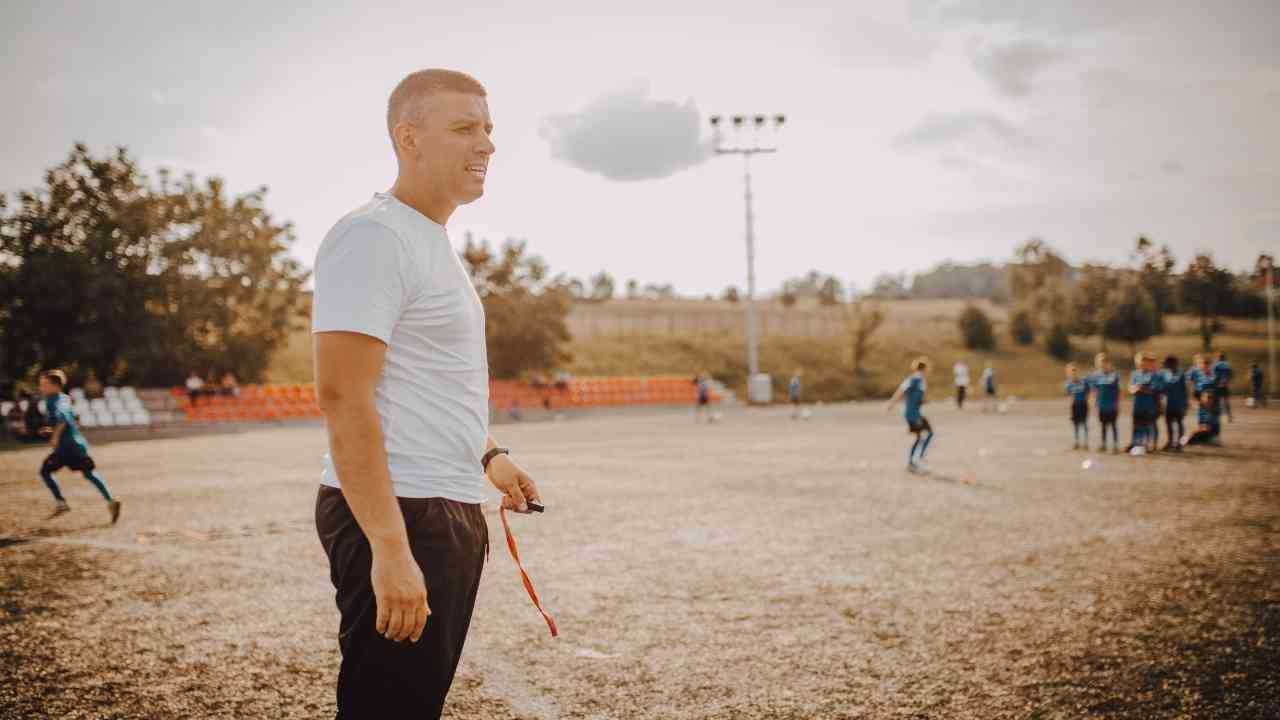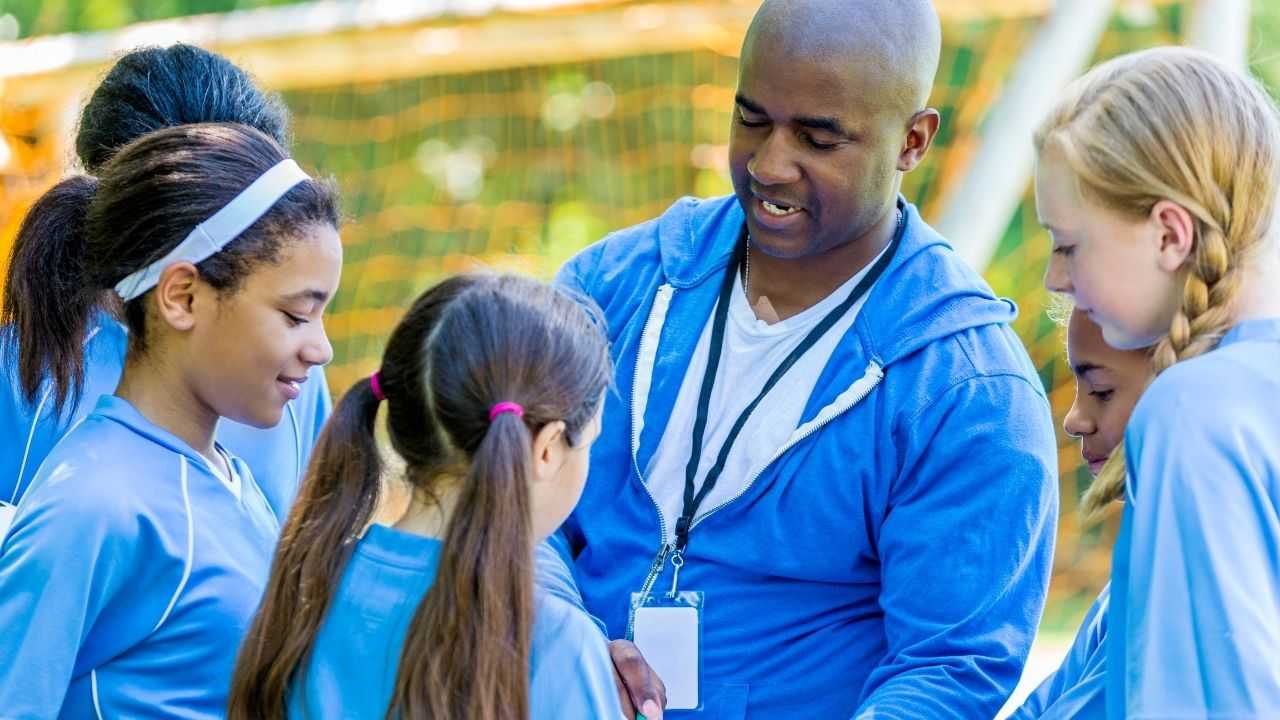Yes, You Have the Time to Coach
If you have the will to coach, there is always a way
Sue Pierce
| 7 min read

Canva
Work, school, kids, groceries, taxes – the list can go on and on… and on. Life is busy. Adding “coach” to your list of responsibilities might seem daunting. But it is doable.
Here’s how five very different volunteer coaches figured out how to find time despite life’s various challenges — and how you can, too.
You can coach… even if you have a long commute
The average commute in the US is just over 27 minutes, but more than 14 million Americans travel over an hour to get to work.
When Aaron Coffin first started coaching rec soccer 10 years ago, he was working as a director of marketing for a tech startup in Boston. It was a time-consuming job, with a long commute – 45 minutes each way on the best days. “It was hard to find the time to really plan,” he says, but he made it work by using his train commute to his advantage.
Once or twice a week he would spend his ride to work researching drills and watching soccer videos. He would also leave his office early to get to practice on time, first changing into a t-shirt and shorts so he could hit the ground running. Because his train commute was unpredictable, he also made sure to always coach with at least one other person so the players were never left stranded. It was a challenge, he says. But by getting creative during his commute and leaning on his co-coach, he figured out how to get it all done.
You can coach… even if you have an intense job
In 2019, more than 97 percent of families with children had at least one working parent. Based on that math, if you’re a volunteer coach, you probably also have a job.
Katie Naylor is an internal medicine doctor in Palmer, Alaska. She also coaches nordic skiing, even though it’s a struggle to fit it into her crazy work schedule. “It’s a lot of scrambling, but it’s totally worth it to me,” she says. Once she gets there, it can be hard to make the switch from doctor to coach. But as soon as her skis are on, there’s no place she’d rather be.
The ski program in Palmer begins after Christmas when there is minimal daylight in Alaska. Practice starts and ends in the dark, and kids ski with headlamps on.
“It’s great to go out and hear kids giggling in the dark,” she says. It’s also a great way to fit exercise into her busy life. So each year, she figures out how to make the schedule work.
You can coach… even if you’re a woman
Since most volunteer coaches are parents, it seems like there should be plenty of moms signing up – but that’s not the case. Studies done by USC sociologist Michael Messner show that less than 15% of youth sports coaches are women.
JJ McGawn played competitive soccer throughout college. But she hesitated to sign up to coach her daughter’s U6 team because of what she saw on the field and on the sidelines.
“I feel like kids sports are still pretty male-dominated and old school coaching styles are still for some reason accepted,” she says. She is not a big yeller, but she had witnessed both coaches and parents screaming at the players.
Still, she decided to go for it and had a blast coaching the Sparkly Ladybugs that first season. But she has some stories – like that one time a dad tried to take over her practice. Unlike him, she was up-to-date on the current rules of play. He quickly realized he was overstepping, and McGawn was happy to have him help in an assistant role.
McGawn also recommends a tip she learned from SafeSport – the 24-hour rule. If a parent is upset with a coaching decision, they need to wait 24 hours before contacting the coach. “It allows the coach and parents to get a bit more perspective and look at the big picture of player development rather than the five minutes of playing time at issue,” she says. This has helped her succeed with most parents over her seven years of coaching.
You can coach… even if you have young kids
When she signed up to coach her daughter’s soccer team, McGawn wasn’t sure what to do with her 7-year-old son during practices. So she and a friend devised a novel solution that solved both of their childcare challenges. A friend, who also had a son and daughter, signed up to coach the boys, and she and McGawn organized practices at the same time and swapped their kids at the field. It worked out so well, the two coaches continued this setup for several years.
Katchen Gerig, of Newburyport, Massachusetts, also overcame a childcare issue. An avid soccer player, Gerig really wanted to coach her 3-year-old son’s soccer team, but she had recently given birth to her second son. Her husband worked in Boston and would leave the house at 5:30 in the morning, often returning after 7 at night. With no one else to watch her baby during soccer, she just strapped her infant son to her chest in a carrier and led practice each week. “I ran up and down the sidelines and held his head,” she says. “I was really determined. I just really wanted to be involved.” The 3-year-olds didn’t even notice.
You can coach… even if you have no idea what you’re doing
Although Gerig had played soccer for most of her life, she had no idea how to coach 3-year-olds. “It’s not like older soccer,” she says. Luckily, the Newburyport Youth Soccer Association (NYSA) held a training day for new coaches. A local high school coach passed out lesson plans and went over them in detail.
Her biggest takeaway was that this age group was too young to do anything but play games. “The whole idea was to keep it fun and interesting,” she says. Gerig used those lesson plans for several years and went on to become a NYSA board member.
You can coach… even if you don’t have kids on the team (or at all!)
When Aidan O’Dea graduated from the University of California, Davis, in 2017 and moved to Marin County, he wanted to find a way to get involved in the community. At a gas station one day, he saw a poster for the Southern Marin Broncos football team. He had played for the Broncos as a kid. “I thought, ‘That’s what I’m going to do.’ “It’s been perfect,” he says. “In the fall, I know that I have this fun thing that I really enjoy doing.”
While most volunteer coaches have a kid on the team, O’Dea says it’s an advantage that he doesn’t. Parents of the players know there are no politics with his coaching. He’s not putting someone in a certain position because he’s related to the player. His co-coach is also a young guy with no kids on the team. “When we give our critiques of kids,” he says, “it really is coming from a point that we want all these kids to be great.”
Related articles
Wanted: More Moms on the Field




